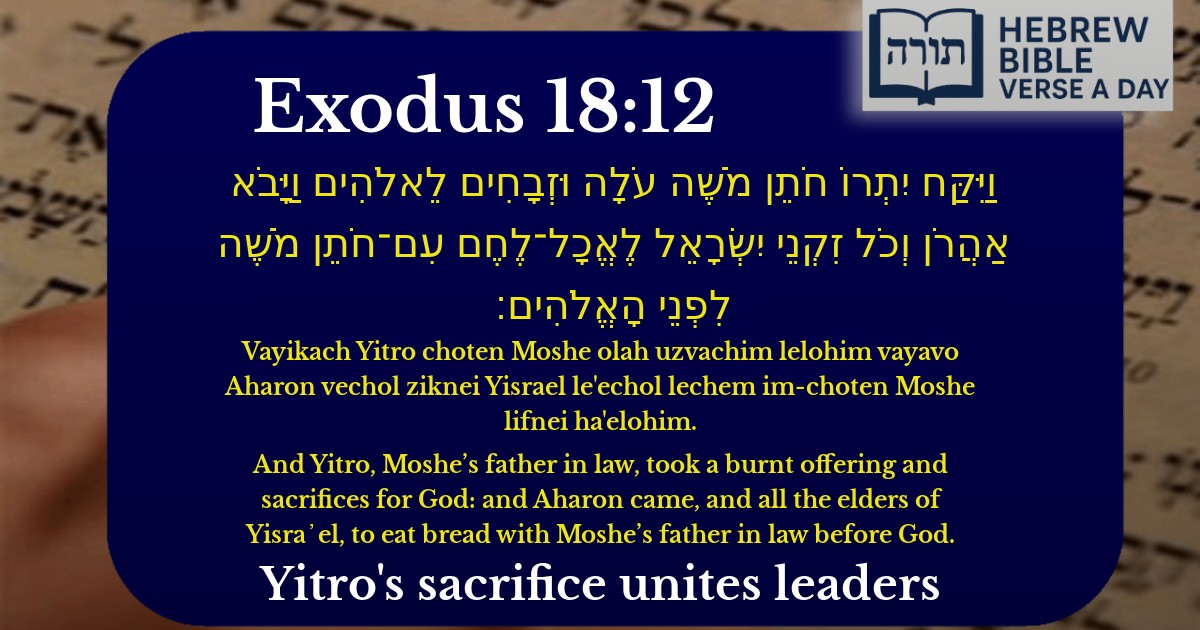Join Our Newsletter To Be Informed When New Videos Are Posted
Join the thousands of fellow Studends who rely on our videos to learn how to read the bible in Hebrew for free!
Hebrew Text
וַיִּקַּח יִתְרוֹ חֹתֵן מֹשֶׁה עֹלָה וּזְבָחִים לֵאלֹהִים וַיָּבֹא אַהֲרֹן וְכֹל זִקְנֵי יִשְׂרָאֵל לֶאֱכָל־לֶחֶם עִם־חֹתֵן מֹשֶׁה לִפְנֵי הָאֱלֹהִים׃
English Translation
And Yitro, Moshe’s father in law, took a burnt offering and sacrifices for God: and Aharon came, and all the elders of Yisra᾽el, to eat bread with Moshe’s father in law before God.
Transliteration
Vayikach Yitro choten Moshe olah uzvachim lelohim vayavo Aharon vechol ziknei Yisrael le'echol lechem im-choten Moshe lifnei ha'elohim.
Hebrew Leining Text
וַיִּקַּ֞ח יִתְר֨וֹ חֹתֵ֥ן מֹשֶׁ֛ה עֹלָ֥ה וּזְבָחִ֖ים לֵֽאלֹהִ֑ים וַיָּבֹ֨א אַהֲרֹ֜ן וְכֹ֣ל&thinsp
וַיִּקַּ֞ח יִתְר֨וֹ חֹתֵ֥ן מֹשֶׁ֛ה עֹלָ֥ה וּזְבָחִ֖ים לֵֽאלֹהִ֑ים וַיָּבֹ֨א אַהֲרֹ֜ן וְכֹ֣ל&thinsp
🎵 Listen to leining
Parasha Commentary
📚 Talmud Citations
This verse is quoted in the Talmud.
📖 Zevachim 116a
The verse is referenced in a discussion about the sacrifices brought by Yitro (Jethro) and the participation of Aaron and the elders of Israel in the sacrificial meal, highlighting the significance of their actions in the context of divine service.


The Significance of Yitro's Offerings
Rashi (Shemot 18:12) explains that Yitro brought olah (burnt offering) and zevachim (sacrifices) as an expression of gratitude to Hashem for the miracles performed for Bnei Yisrael. The olah, which is entirely consumed on the altar, symbolizes complete dedication to Hashem, while the zevachim, which are partially eaten, represent a shared celebration of this newfound connection.
The Participation of Aharon and the Elders
The presence of Aharon and the elders at this meal is significant. The Midrash Tanchuma (Yitro 7) notes that this gathering demonstrated unity and respect for Yitro, who had acknowledged Hashem's greatness. Rambam (Hilchos De'os 6:3) emphasizes the importance of honoring converts, as Yitro—a former idolater—had now embraced monotheism.
Eating "Before God"
The phrase "לִפְנֵי הָאֱלֹהִים" (before God) is interpreted by the Sforno (Shemot 18:12) to mean that this meal was conducted with sanctity and reverence, akin to partaking of korbanot (sacrifices) in the Mishkan. The Talmud (Zevachim 116a) connects this event to the future revelation at Har Sinai, suggesting that Yitro's acceptance of Hashem foreshadowed the broader covenant with Bnei Yisrael.
Key Lessons from the Verse